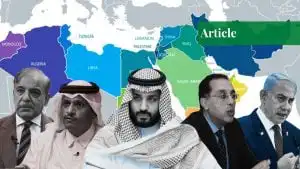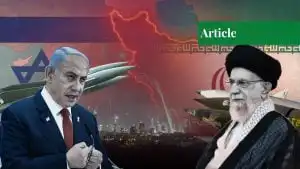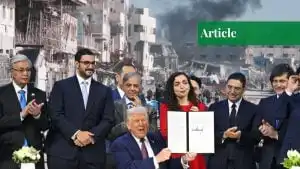“We were bombed every day,…At first, the United States said that they were just targeting military targets, but they were bombing everything, including civilian buildings—just like what they are doing to Gaza now.”
– Richard Lai, LA Chinatown organizer and refugee from the Vietnam War
From the 19th century onward, Vietnam struggled against the oppressive yoke of French colonial rule which claimed to have entered Vietnam to nurture civilization but instead exploited the country. Vietnam encountered another dominion during World War II when the Japanese invaded the country. Following their defeat, the Japanese forces left in 1945, leaving Vietnam under the reign of the French Emperor Bao Dai. Emperor Bao Dai utilized the French military forces and created a puppet government in Vietnam with its capital in Saigon. This again created a situation where conflict broke out and by 1954 escalated into a full-fledged war. The war was eventually victorious for Vietnam because of their great resilience and determination. In this hard-fought victory, Vietnamese forces recaptured Saigon in 1975, ultimately leading to the reunification of Vietnam under communist rule, which marked the official end of the war in 1975.
Over the years, similar scenarios of persistent attack and violence have been seen in Palestine. The ongoing conflict between Israel and Palestine can be traced back to the early 1900s. Tensions started to rise between the Arab residents of Palestine and the Jews who immigrated there, asserting force to create a “homeland,” as is the main aim of Zionism. The State of Israel achieved independence in 1948 which ushered the first Arab-Israeli conflict. This armed conflict rendered many Palestinians homeless in what has come to be derisively referred to as the “Nakba” (catastrophe).
Throughout the following years, the conflict has been characterized by several noteworthy events including the 1967 Six-Day War, which ultimately resulted in Israel gaining control over the West Bank and Gaza Strip. The conflict is still ongoing, and Palestinian resistance movements appeared after that, with groups like the Palestine Liberation Organization (PLO) and Hamas.
How Similar are the Vietnam and Palestine Struggles?
Many insist that the war in Gaza today is similar to the Vietnam War in the 1960s and that Israel is using the same tactics now as the USA did against Vietnam. Students protesting is one of these similarities. The students protesting against the Vietnam War at Columbia University and Kent University were arrested by the police which is similar to the current situation of students protesting against the Palestine massacre. They are not just being denied the right to student demonstrations but are in turn deemed as a major source of violence.
In Vietnam, people encountered a guerrilla war and relied on unconventional tactics, jungle warfare, and the support of local populations to counter the overwhelming firepower of the U.S. military. Likewise, the resistance in Palestine has used guerrilla tactics, like homemade rockets, tunnels, and ambushes against the Israeli Defense Forces which possess far superior military technology.
The strength of these resistance groups also comes from their close ties to the local people, making civilians active participants or passive supporters of the mission. For the Viet Cong, the rural Vietnamese people provided shelter, food, and information, just as Palestinian people played a vital role in supporting the resistance against Israeli occupation through solidarity and logistical aid.
Despite the differences in time and geography, both Vietnam and Palestine represent struggles against external powers perceived as occupiers. In Vietnam, the U.S. backed the Government of South Vietnam against communist forces, while in Palestine, Israel is seen as a colonial state on Palestinian land. Both conflicts involved tactics like ambushes, hit-and-run strikes, and using international support to further their causes.
The legal aspects of these conflicts are also notable. Both struggles raised issues in front of the United Nations (UN) regarding international humanitarian law (IHL). The Vietnam War resulted in new protocols for the Geneva Conventions aimed at better protecting civilians and non-state actors resisting colonial or occupying powers. Groups like the PLO (Palestinian Liberation Organization) and, more recently, Hamas have historically framed their resistance within international rights to oppose foreign occupation, as stated in treaties like Protocol I of the Geneva Conventions.
Diplomatic Responses
While both Vietnamese and Palestinian struggles have gained sympathy and solidarity from human rights movements worldwide, the Vietnam and Palestine conflicts have faced contrasting diplomatic responses. During the Vietnam War, anti-war protests in Western nations, especially the U.S. significantly influenced public opinion and pressured political leaders to end the conflict. The Palestinian struggle has faced more complex geopolitics while generating significant international solidarity movements (such as the Boycott, Divestment, and Sanctions movement). The strong political and military support Israel receives from the U.S. and other Western nations has prolonged the conflict without a similar resolution.
Lynn Ta, a Vietnamese refugee, and LA Chinatown organizer, in a conversation with Promise Li and Richard Lai, states, “It’s like a horrific déjà vu when you see the images online… airstrikes, tunnels, refugees escaping on flimsy boats. The United States always has a hand in these proxy wars. They used Vietnam to solidify their imperialist control in Southeast Asia, just as they used Israel to control the Middle East.”
He further adds that he believes in the strength and will of Palestinians to achieve liberation even when they are outnumbered and outgunned; just as how the Vietnamese achieved liberation and independence.
If you want to submit your articles and/or research papers, please check the Submissions page.
The views and opinions expressed in this article/paper are the author’s own and do not necessarily reflect the editorial position of Paradigm Shift.
Saba Ikram is an English Literature graduate with a love for writing, learning, and exploration.






